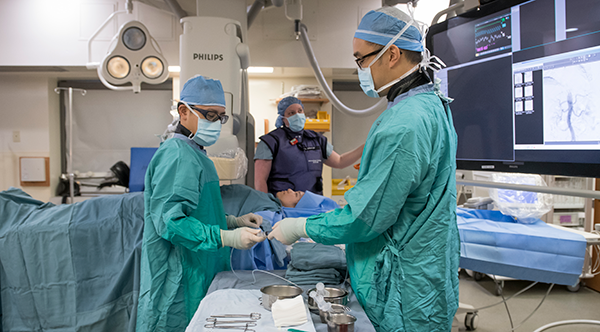Interventional Radiography
What is interventional radiography?
Interventional radiography uses minimally-invasive image-guided procedures to diagnose and treat diseases in nearly every organ of the body. After making a small incision, an interventional radiologist will guide a thin wire and a catheter (a flexible, narrow tube) through a blood vessel, duct (a passage leading from an organ or gland) or other passageway to target and treat the source of your pain or disease.
Our interventional radiologists conduct procedures such as angioplasty to repair blood vessels (arteries or veins); biopsies; inserting or replacing drainage tubes; and venous access ports that allow access to the veins over an extended time.

Receiving interventional radiography: what to expect
 Preparing for the procedure
Preparing for the procedure
If you are scheduled for an interventional procedure, our team will contact you the day before your procedure to review what will happen and how you can prepare. If you have any questions about your procedure, please call 416-480-4336.
 On the day of the procedure
On the day of the procedure
Most procedures will take approximately 6 to 8 hours, including preparation and recovery. Some procedures require you to be admitted to hospital the day before your procedure.
Check-in for your appointment at the Bayview Campus (2075 Bayview Ave), M-wing, ground floor, room 102 (MG 102).
 During the test
During the test
When your procedure team is ready, you will be brought into the procedure room and participate in a safety checklist with your interventional radiologist and your health-care team before your procedure begins.
Most procedures are done under local anaesthesia and conscious sedation so you’ll be relaxed, but awake during the entire process. This is so you can follow any necessary breathing instructions your care team may have for you during your procedure.
A small incision will be made to guide a thin wire and a catheter through a passage to reach the source of your pain or disease. Contrast material (also known as dye) will be injected through the catheter to take images of the body while your condition is being treated.
After the procedure, the catheter will be removed and pressure will be applied to the puncture site to prevent bleeding. You will then be transferred to a recovery area for three to four hours.
 After the test
After the test
Your care team will review your recovery instructions, possible complications and any necessary medications with you before you are discharged. Different procedures require different recovery instructions, but generally, you should avoid any physical exertion for 24 hours after your procedure.
Location and contact
Inverventional Radiography
Sunnybrook Health Sciences Centre
2075 Bayview Avenue,
M-wing, ground floor, room MG 102
Toronto, ON M4N 3M5
Phone: 416-480-4336
Hours
Monday-Friday: 8:00 a.m. - 4:00 p.m.






